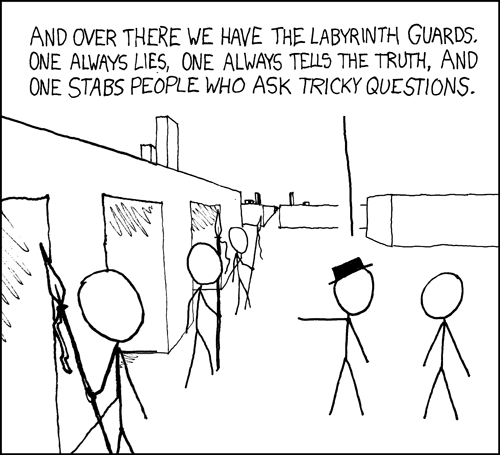|
|
 Originally Posted by OngBonga

@ philly
The first question... If I were to ask "Is 2nd random", would you say Uu?
The answer we get, Uu or Ww, tells us which one out of 2nd and 3rd isn't random. That is all it tells us.
If 1st is truth, and random is indeed 2nd, then truth would answer "yes" if Uu means yes, and "no" if Uu means no. Either way, his answer is Uu if random is 2nd, and Ww if is random is 3rd.
If 1st is false, and random is 2nd, then false would answer the question "yes" if Uu means yes, and "no" if Uu means no. Either way, his answer is also Uu if random is 2nd, and Ww if random is 3rd.
If random is 1st, then he's not 2nd or 3rd, regardless of the answer he gives us.
So, if we get Uu, then we know 3rd cannot be random (because truth said 2nd is random, or false said 2nd isn't random, or random is 1st),
and if we get Ww, we know 2nd can't be random (because truth said 2nd isn't random, or false said 2nd is, or random is 1st).
We then talk to him.
I'll devote more time to this later this evening if no-one has cracked it. I'm really not far away, but every time I think about it my head starts to melt.
I still can't see how you are determining that C (can we please use alphabetical representations of the statues? We are numbering the questions, so numerical representations of the statues makes things harder to follow than they should be) cannot be random.
If A says "Ww" he could be:
-random himself
-the liar saying "yes, B is random (read, B is not random, meaning C is random)"
-the liar saying "no, B is not random (read, B is random)"
-truth saying, "yes, B is random"
-truth saying, "no, B is not random (meaning C is random)"
If A says "Uu" he could himself be random,
-random himself
-the liar saying "yes, B is random (read, B is not random, meaning C is random)"
-the liar saying "no, B is not random (read, B is random)"
-truth saying, "yes, B is random"
-truth saying, "no, B is not random (meaning C is random)"
|





 Reply With Quote
Reply With Quote




















